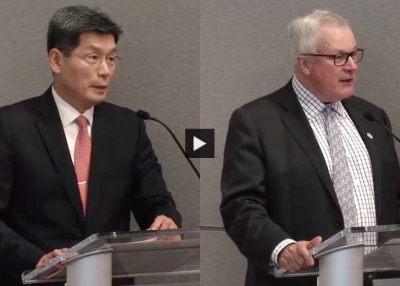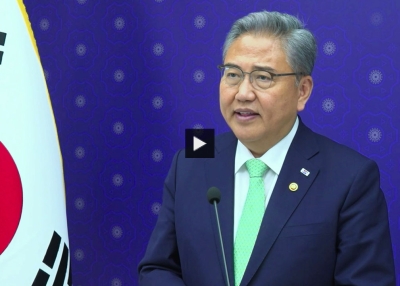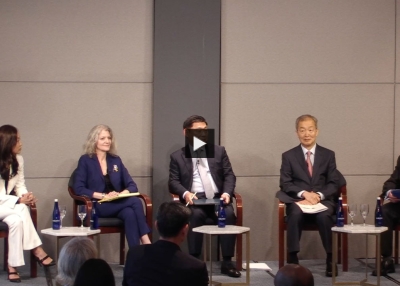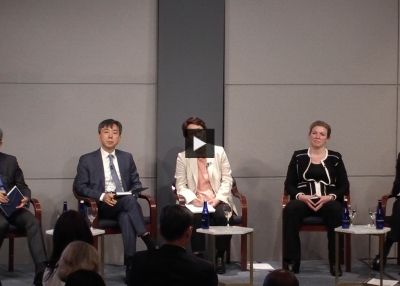The U.S.-Korea Partnership Amid 21st Century Challenges

The ROK-U.S. alliance is evolving in response to new pressures in the international system wrought by COVID, conflict, and connectivity. The partnership, and South Korea’s vision of itself as a “Global Pivotal State,” remain based on shared values and common threat perceptions. But as the U.S. and South Korea look to safeguard their interests, remain technologically competitive, mitigate nuclear threats, and promote a stable and peaceful regional environment conducive to the free flow of global trade, important questions remain on how the two partners can work separately, together, and in concert with like-minded partners to navigate the opportunities and challenges ahead.
The Asia Society Policy Institute (ASPI) hosted two panels featuring distinguished U.S. and Korean speakers for in-depth discussions about Korea’s challenges, its role in ensuring regional harmony, as well as opportunities and challenges in Korea’s technology and trade sectors. A public reception followed the panel discussions.
AGENDA
Monday, June 12, 2023
4:00 – 4:30 p.m. ET | Introductory Welcoming Remarks
- KIM Gheewhan, President, Korea Foundation
- Ernie Thrasher, Global Trustee, Asia Society; CEO & Chief Marketing Officer, Xcoal Energy & Resources
Keynote Address
- PARK Jin, Foreign Minister, Republic of Korea (virtual remarks)
4:30 – 5:30 p.m. ET | South Korea’s Security
The U.S.-Republic of Korea alliance stands poised to meet 21st century challenges on the basis of shared values and shared threat perceptions. President Yoon Suk-yeol’s State Visit produced the Washington Declaration, which reinforces the enduring partnership and deepening commitment to shared strategic interests and values; and the Nuclear Consultative Group, to strengthen deterrence against nuclear and other threats. Our discussion explored how these mechanisms will shape the regional and global security environment, and the opportunities and challenges ahead for the alliance as Korea looks to cement its role as a Global Pivotal State.
- AHN Ho-Young, Former Ambassador of the Republic of Korea to the United States
- HAN Suk-Hee, President, Institute for National Security Strategy; Professor, Yonsei University
- Allison Hooker, Senior Vice President, American Global Strategies
- Sue Mi Terry, Director of the Asia Program and the Hyundai Motor-Korea Foundation Center for Korean History and Public Policy, Wilson Center
- Daniel Russel, Vice President for International Security and Diplomacy, Asia Society Policy Institute (Moderator)
5:45 – 6:45 p.m. ET | Korea’s Tech and Trade
Through practical and policy collaboration, the United States and South Korea are seeking to better safeguard critical infrastructure, protect intellectual property and mitigate cyber threats. Join us for a discussion to unpack how the U.S., South Korea, and like-minded partners can navigate the shifting dynamics of international tech competition, while ensuring supply chain security and resiliency. This discussion covered China’s role in driving changes in the global high-tech industry, how the U.S. and South Korea are responding, and how the two countries can seize opportunities together in STEM education and cutting edge tech developments.
- LEE Jaemin, Professor of Law, Seoul National University School of Law
- SON Ji-Won, Director-General, Technology Policy Research Institute, Korea Institute of Science and Technology
- SON Sang Soo, Vice President, SK Hynix
- Edlyn Levine, Chief Science Officer and Co-Founder, America’s Frontier Fund
- LEE Chung Min, Senior Fellow, Carnegie Endowment for International Peace; Professor, Institute of Security Convergence, KAIST (Moderator)
6:45 – 7:30 p.m. ET | Post-Event Public Reception
Attendees from the public program joined us for a public reception, which included refreshments.





